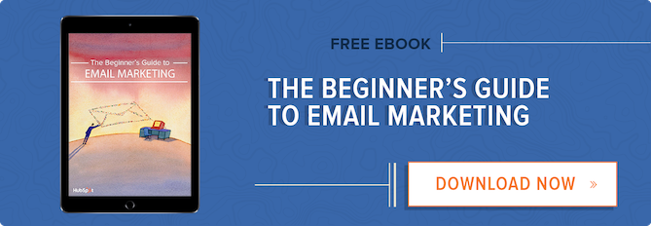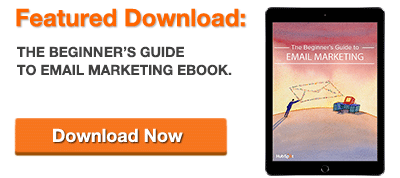I have some bad news: Your email marketing database degrades by about 22.5% every year.
Your contacts’ email addresses change as they move from one company to another, opt-out of your email communication, or abandon that old AOL address they only use to fill out forms on websites.
As a marketer, it’s your job to make sure you’re constantly adding fresh contacts to your email marketing campaigns so you can keep your numbers moving up and to the right. (But not by purchasing email lists — learn why you should never buy an email list in this post.)
What is an email list?
An email list is a collection of email addresses that a business can create by engaging with potential customers through lead-generating campaigns. Email lists can shrink as members opt out of email subscriptions, and grow as the business solicits contact information from website visitors.
If you’re not working on building your email list already, or you’ve run out of ideas to do so, here are 29 simple ways to grow that email list.
29 Creative List Building Techniques
Using Email
1. Create remarkable email content
Your content needs to be amazing if you want people to stay subscribed and forward your emails to their own network. If it’s entertaining enough, they’ll always look forward to your emails.
2. Encourage subscribers to share and forward your emails
Include social sharing buttons and an “Email to a Friend” button in your marketing emails. That way, you’ll gain access to their friends, colleagues, and networks and expand your contact list. At the bottom of your emails, include a “Subscribe” CTA as a simple text-based link so that the people receiving the forwarded emails can easily opt-in, too.
3. Segment your email lists by buyer persona
Use varying types of email subscriptions to send more targeted content to specific segments of your marketing personas. Email recipients are more likely to click through emails that cater to their specific interests, so if you create multiple, targeted subscription types, you’ll increase the chance that visitors will subscribe to one of them.
4. Reinvigorate a stale email list with an opt-in campaign
Do you have an older list that you suspect has mostly decayed? Create an engaging opt-in message and send it to your old list encouraging contacts who wish to re-opt-in — promising to remove all contacts who don’t respond. Though it might seem counterintuitive to remove folks from your email lists in order to grow them, emailing only engaged contacts could improve your deliverability and increase the odds of your email getting shared with those outside your current contacts database.
5. Add a link to your employees’ signatures
Hyperlinked email signatures can lead people to a landing page where they can sign up for your mailing list. Plus, if you’re already in a natural email conversation with them, subscribing to more emails can be a natural next step.
With New Content
6. Create a new lead-generation offer
Develop a free ebook or whitepaper and host it on a landing page that asks visitors to provide their email address in order to download it. This is called a “gated offer.” (Need ideas? This blog post lists 23 ways to create lead-generation content quickly and easily.)
7. Create a free online tool or resource
Free online tools make your users’ lives easier, and all they have to do is sign up with their email address. For example, we’ve created quite a few free tools, like Marketing Grader, to gather email addresses.
8. Create ‘Bonus’ Content
Not all gated content is worth it to a website visitor. In order to gain their interest, you need to give them free content first. Start with a blog post that offers beginner advice on a subject, then offer “bonus” content with more advanced tips that they can access by submitting their email address via a landing page.
Using Social Media
9. Promote an online contest
Use your social media accounts to host a free giveaway in exchange for contact information. Encourage entrants to click through to your website and sign up using their email address.
10. Promote one of your lead-gen offers on Twitter
Create a Twitter campaign to promote an ebook or a free resource to your followers that requires an email address to redeem.
11. Promote an offer through Facebook that requires an email address
Promote content on your Facebook Timeline that your followers can sign up to access. Be sure to add social sharing buttons to the landing pages and thank-you pages you send them to so you encourage your leads to share those offers with their own networks.
12. Add a call-to-action button to the top of your Facebook Business Page
We added calls-to-action (CTAs) on our Facebook page for HubSpot Academy below. The value in this list building technique is in the destination: Link your Facebook page’s CTA button to a landing page that requires an email address for access to a special resource.
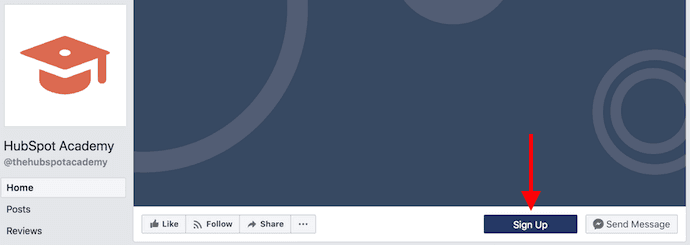
13. Publish links to gated offers via social media
Use your Facebook Business page or LinkedIn Company Page to post links to the same gated offers you might also host on your blog posts. You can also do this in appropriate and relevant LinkedIn group discussions — just be mindful of the topic being discussed to ensure your offer is a welcome addition to the conversation.
14. Use Pinterest to promote gated visual content
Pinterest can play host to visual content that encourages visitors to sign up to see more content. For example, HubSpot created a Pinterest board where we pin the well-designed covers of our marketing ebooks. From this board, we’ve been able to generate new leads and grow our email list.
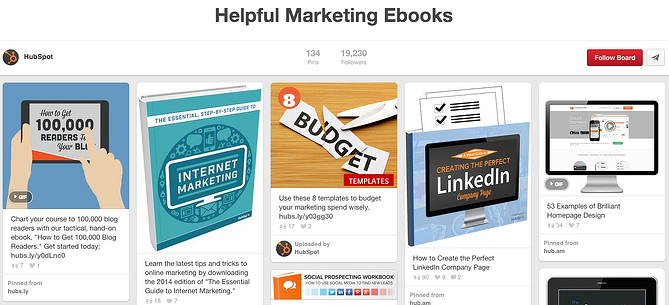
15. Add engagement features to your YouTube channel
Add hyperlinked “end cards” to your YouTube videos that encourage people to subscribe to your channel via their email address. You can see an example of this below, to the bottom right of the video screen. You can also include links to relevant landing pages in your videos’ text captions below your published video.
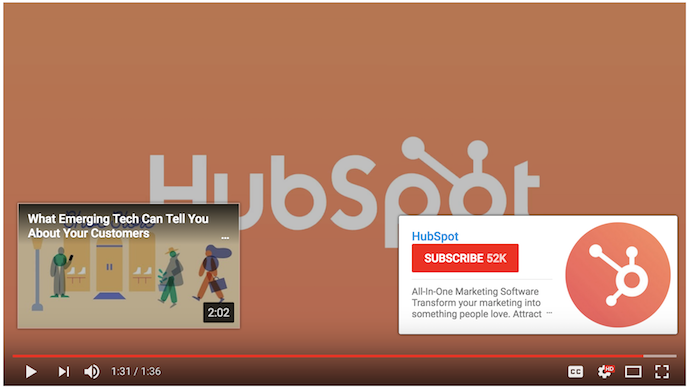
On Your Website
16. Ask website visitors for feedback
People enjoy offering feedback on information that pertains to them. On certain pages of your website, include a form that asks visitors what questions they might have about your business. You might also create a live chat tool that invites questions and email addresses from people who have stayed on your website for a certain amount of time.
17. Shorten the length of your lead-capturing forms
It’s tempting to collect as much information on a user as possible right away, but adding too many fields to your landing pages and lead-capturing forms can actually scare people off. Reduce the length of your forms to just two to three fields — you can collect more information from them once you start a conversation.
18. Link to offers across your website that capture email signups
Don’t make people dig around your site to stumble across subscription options. Keep your offers up front, and include calls-to-action on multiple pages of your website. Some key places to consider include your website’s homepage, your ‘About Us’ page, and your ‘Contact Us’ page.
19. A/B test different campaign copy
You might be doing all the right things to generate leads — landing pages, gated content, contests, and more. The problem might be that the design or copy itself isn’t driving the engagement you need. A/B test (also known as “split test”) different aspects of your list-building campaigns with different versions of the same content. This includes the call-to-action text, the color of the gated offer, the time of day you’re posting to social media, and even where on your website these signup forms are placed. Sometimes a small change can drive hundreds more conversions.
20. Create a blog that readers can subscribe to
If you don’t already blog, you should! Blog posts help you increase your ranking on search engines like Google, and allow you collect blog subscribers that you can then upgrade to more actionable email campaigns over time.
21. Guest blog for other websites with a call-to-action
There are tons of websites and publishers out there that cater to your audience — and larger portions of it. Guest blogging for these websites helps you expand your contact list to this audience. When creating content as a guest blogger for another website, include a call-to-action, as well as a link in you author byline, for readers to subscribe to your site’s blog or email newsletter.
22. Include customer reviews on your website and landing pages
Customer reviews are the “social proof” that encourages people to join in on something. It’s one thing for you to tell people to sign up for a campaign, but it’s another thing for your happiest customers to say it too. Publish your best reviews from communities like Yelp right to your website. This adds genuine value to your landing pages when people are on the fence about submitting their contact information.
With a Partner
23. Run a promotion on a partner website or email newsletter
Similar to guest blogging, partner websites can allow you to target a new but appropriate audience with a campaign on your own website. Use this partner source to direct visitors back to your website — where you’re already collecting email addresses.
24. Host a co-marketing offer with a partner
Creating an ebook or webinar with a partner can split up the work of content creation and allow you to share the audience of a similar business. After you release your content, split the leads you generate with your partner.
With Traditional Marketing
25. Collect email addresses at a trade show
Offline events like trade shows are highly anticipated growth opportunities for professionals in your industry. Demo your latest product at an appropriate conference and collect signups in-person. Once you’re back at the office, import these signups into your contact database. Be sure to send these contacts a welcome email that confirms their opt-in to your list. (See #8 in this blog post for tips on sending welcome emails.)
26. Host your own offline, in-person events
Meetups, seminars, hackathons, educational panels, and even your own conferences put you front and center of a networking event, and those who attend are often more qualified to be contacted because they came to your event. Take the opportunity to collect email addresses in exchange for the info and demos you provide at the event.
27. Host an online webinar
Webinars are the perfect opportunity to talk about your industry and access the audience of thought leaders whom you might want to present with. The best part? Webinars are normally registered for via email, making your listeners more willing to be contacted afterward. Collect email addresses at registration.
28. Add QR codes to your display ads
Incorporate a QR code into your print marketing collateral that people can scan for more information on the printed content. Create the QR code such that it requires an email address to access the additional content. (There are many free QR code makers online that make this process easy.)
29. Collect emails in your store
If you have a brick-and-mortar presence where you interact with customers face-to-face, create an email campaign just for those walk-ins. Launch a store membership they can sign up for via email at the register. This is a smart way to keep in touch with repeat customers and reward their loyalty to your product.
These are all examples of things you can start doing today to increase your business’ email database. Many of them are not complicated or difficult to implement. The key is to attack email list-building from as many angles as possible.
As you grow your email list with fresh, opt-in contacts, you’ll be able to nurture them with middle-of-the-funnel offers that allow you to convert early-stage leads into sales-ready leads.
![]()





